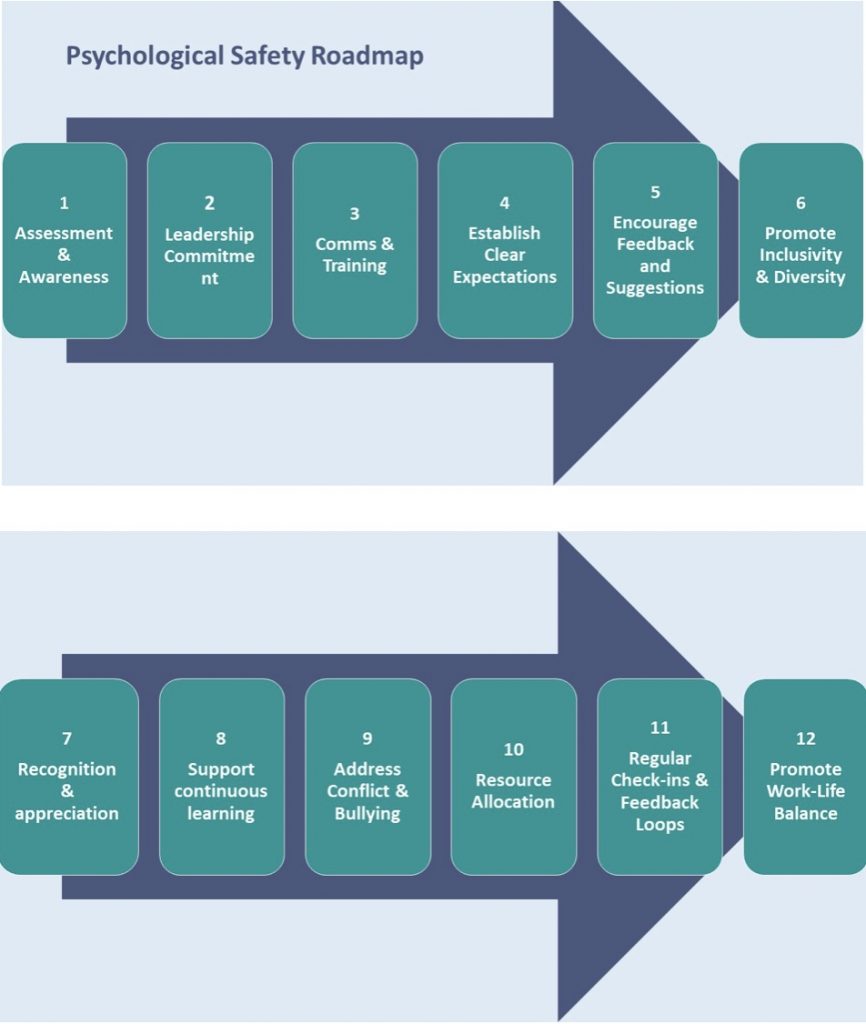Welcome to the second of our articles on psychological safety at work. We promised you some guidance on creating a road map for getting there – a step-by-step plan to implement strategies and initiatives that promote a culture of trust, open communication, and support within your workplace.
Here are our suggestions to help you get started:
1. Asessment and Awareness:
- What is the current culture and what level of psychological safety do you have at present? How can you take the temperature of your organisation? (Staff survey? Focus groups? Exit interviews?)
- Raise awareness amongst leadership and staff about the importance of psychological safety and its positive impact on productivity and wellbeing
2. Leadership Commitment:
- Gain commitment from your senior leaders to prioritise and actively participate in fostering psychological safety (how will you ‘sell’ this to them?)
- Encourage your leaders and mangers to model behaviours that promote psychological safety e.g. open communication, vulnerability, and active listening
3. Communication and Training:
- Provide training for everyone on the concept of psychological safety and its benefits
- Develop communication materials that reinforce your organisation’s commitment to psychological safety
4. Establish Clear Expectations:
- Define and communicate clear organisational expectations for behaviour, communication, and performance that support a psychologically safe environment
- Ensure that everyone understands the boundaries and consequences of inappropriate behaviour
5. Encourage Feedback and Suggestions:
- Establish multiple channels for employees to provide feedback, suggestions, and concerns, anonymously if possible
- Regularly request feedback from employees to identify areas for improvement
6. Promote Inclusivity and Diversity:
- Foster an inclusive environment that values diverse perspectives and backgrounds
- Encourage collaboration and teamwork that appreciates and respects different viewpoints
- Work with your EDI&B champions and allies to support each other in promoting the twin benefits of inclusion and psychological safety
7. Recognition and Appreciation:
- Recognise and appreciate employees who demonstrate behaviours that contribute to psychological safety, such as speaking up or supporting their colleagues
- Celebrate efforts and progress, not just final outcomes
8. Support Continuous Learning:
- Encourage a growth mindset and support ongoing learning and development opportunities for staff
- Recognise mistakes and mis-steps as opportunities for growth and improvement
9. Address Conflict and Bullying:
- Develop clear procedures for addressing conflict and bullying promptly and impartially
- Provide training to help your people handle conflicts confidently and constructively
10. Resource Allocation:
- Work to ensure there are sufficient resources (financial and non-financial) to support the initiatives that encourage psychological safety in the workplace
- Try to ensure that the organisation has provided the necessary tools and resources for staff to perform their job roles effectively
11. Regular Check-ins and Feedback Loops:
- Are regular one-to-one meetings part of your culture? These provide opportunities for managers and staff to provide feedback and address concerns
- What other opportunities are there for for team members to give feedback to their colleagues and leaders?
12. Promote Work-Life Balance:
- Encourage (and model!) a healthy work-life balance to reduce stress and burnout
- Support flexible work arrangements and time-off policies – research shows that this boosts, rather than impairs, organisational performance
Building psychological safety is an ongoing process that requires focus, attention and consistent effort. It is in the hands of everyone in your organisation, however, we need our leaders to set the example for everyone to follow.
This roadmap is a guide to get you started, and if you regularly revisit each of the above points, identifying areas for improvement as you go, it will lead you towards creating a psychologically safe and supportive workplace environment.

Find out more about the Psychological Safety bite-size learning we offer here.
Learn more about our other bite-size learning sessions here.
Training is a constantly evolving arena. Keep up to date with new and exciting developments, along with details of our latest training courses and workshops by signing up to our newsletter here.


